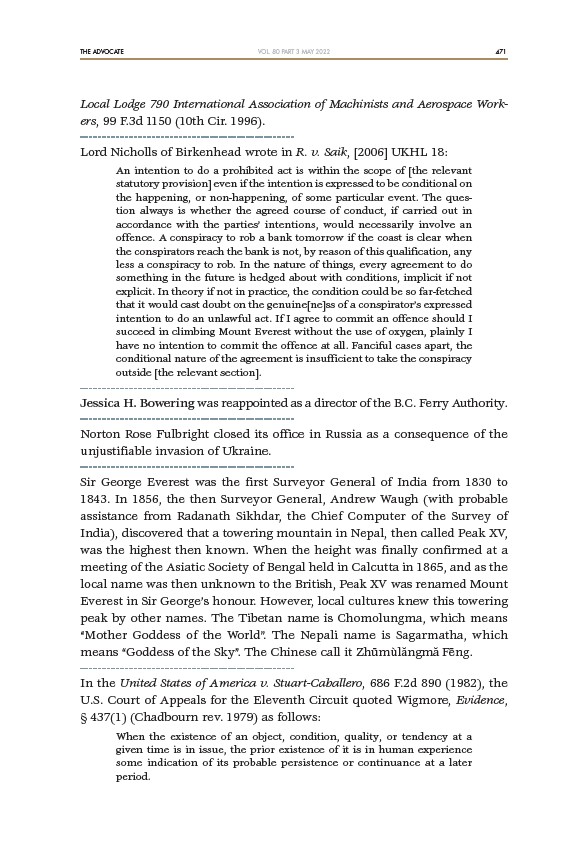
THE ADVOCATE 471
VOL. 80 PART 3 MAY 2022
Local Lodge 790 International Association of Machinists and Aerospace Workers,
99 F.3d 1150 (10th Cir. 1996).
Lord Nicholls of Birkenhead wrote in R. v. Saik, 2006 UKHL 18:
An intention to do a prohibited act is within the scope of the relevant
statutory provision even if the intention is expressed to be conditional on
the happening, or non-happening, of some particular event. The question
always is whether the agreed course of conduct, if carried out in
accordance with the parties’ intentions, would necessarily involve an
offence. A conspiracy to rob a bank tomorrow if the coast is clear when
the conspirators reach the bank is not, by reason of this qualification, any
less a conspiracy to rob. In the nature of things, every agreement to do
something in the future is hedged about with conditions, implicit if not
explicit. In theory if not in practice, the condition could be so far-fetched
that it would cast doubt on the genuineness of a conspirator’s expressed
intention to do an unlawful act. If I agree to commit an offence should I
succeed in climbing Mount Everest without the use of oxygen, plainly I
have no intention to commit the offence at all. Fanciful cases apart, the
conditional nature of the agreement is insufficient to take the conspiracy
outside the relevant section.
Jessica H. Bowering was reappointed as a director of the B.C. Ferry Authority.
Norton Rose Fulbright closed its office in Russia as a consequence of the
unjustifiable invasion of Ukraine.
Sir George Everest was the first Surveyor General of India from 1830 to
1843. In 1856, the then Surveyor General, Andrew Waugh (with probable
assistance from Radanath Sikhdar, the Chief Computer of the Survey of
India), discovered that a towering mountain in Nepal, then called Peak XV,
was the highest then known. When the height was finally confirmed at a
meeting of the Asiatic Society of Bengal held in Calcutta in 1865, and as the
local name was then unknown to the British, Peak XV was renamed Mount
Everest in Sir George’s honour. However, local cultures knew this towering
peak by other names. The Tibetan name is Chomolungma, which means
“Mother Goddess of the World”. The Nepali name is Sagarmatha, which
means “Goddess of the Sky”. The Chinese call it Zh¯umùl˘angm˘a F¯eng.
In the United States of America v. Stuart-Caballero, 686 F.2d 890 (1982), the
U.S. Court of Appeals for the Eleventh Circuit quoted Wigmore, Evidence,
§ 437(1) (Chadbourn rev. 1979) as follows:
When the existence of an object, condition, quality, or tendency at a
given time is in issue, the prior existence of it is in human experience
some indication of its probable persistence or continuance at a later
period.